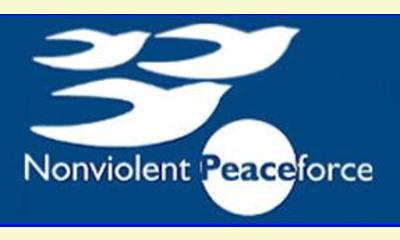|
|
Nonviolent Peaceforce Highlights of 2011
un article par Tim Wallis, Nonviolent Peaceforce
Here are some brief highlights from the Nonviolent Peaceforce in 2011. Thanks to your belief in peace on earth, we've had a great year!

click on photo to enlarge
Sudan
In January, our peacekeepers protected voters during a controversial referendum on southern independence. In July, South Sudan became the world's newest country. The country has been scarred by conflict for more than 40 years. In a decades-long civil war that pitted rebels in the south against a central government, 2 million people were killed and 4 million more were displaced from their homes. In 2011, the Mundri field team provided protective presence and accompaniment and supported an ongoing peace process that brought chiefs, elders, and government officials together to settle on a ceasefire and sustainable peace agreement. The team provided international visibility at sites where displaced people have returned home, as well as accompaniment for chiefs and elders to continue to meet to document the agreements. Our teams have also provided accompaniment to children who have escaped from the Lord's Resistance Army, a rebel group that kidnaps children and forces them to act as soldiers and commit crimes.
The Philippines
In February, peace talks began between the Philippines government and the main insurgent group in Mindanao, the Moro Islamic Liberation Front (MILF). For months before, our peacekeepers had been defusing violence on the ground so that the peace talks, which had stalled many times previously, could resume. At the end of April, the parties concluded the second round of talks in Malaysia. Both parties expressed willingness to compromise in search of a peaceful settlement.
Sri Lanka
Our departure from Sri Lanka this year is bittersweet. Since the end of Sri Lanka's civil war in 2009, NP has continued to focus on civilian protection during a difficult transition period. This year, we've focused on child protection and training locals to take over our work once we're gone. Our Country Director, Steve Alston, has done a superb job ensuring that we fulfill all existing commitments and can conduct a comprehensive evaluation and impact assessment of our work in Sri Lanka over the past eight years.
South Caucasus
This summer, we appointed Dmitry Medlev to serve as Regional Director for the South Caucasus project. Dmitry is a veteran peacebuilding professional who previously served as International Alert's point-person in Kyrgyzstan. In October, Dmitry opened NP's office in Tbilisi, Georgia, and concluded the recruitment of an initial deployment of civilian peacekeepers. Our South Caucasus program will improve the security of people living near disputed boundaries.
Kyrgyzstan
In April, at the request of the government of Kyrgyzstan, Nonviolent Peaceforce sent an exploration team to the country's south. The team met with members of the international community, civil society, and state actors in over 60 meetings. Once we secure the necessary funding-in the first phase of the Kyrgyzstan program-we plan to deploy a 3-person team. The program will grow to 1-2 field teams (in Osh and Jalalabad). Our likeliest local partners in this new initiative are the Coalition for Civil Society and Democracy and the Foundation for Tolerance International, two respected national non-governmental organizations. This is a major step forward for Nonviolent Peaceforce. Thank you for helping us get here.
|








|
DISCUSSION
Question(s) liée(s) à cet article:
Can peace be guaranteed through nonviolent means?,
* * * * *
Commentaire le plus récent:
We have the advantage of an independent evaluation of the Nonviolent Peaceforce initiative in the Philippines conducted by Swisspeace. The evaluation is very favorable, although in the end, as one reads through it, gets the impression that such initiatives can help but cannot bring peace by themselves.
Here is the executive summary:
Nonviolent Peaceforce in the Philippines can look back at more than two years of unique, relevant contributions and constructive engagement in one of the most difficult, political and volatile, contexts to work in: Being the only international non-governmental organization working with and living in close proximity to the most conflict-affected population in Mindanao, NP in the Philippines was able to support and enhance local structures of cease-fire monitoring, early warning, cross-community dialogues, human rights protection, to offer civilian protection and help to reduce the high levels of community violence.
The accepted offer to NP in the Philippines in late 2009 by the conflict parties GRP and the MILF to join the International Monitoring Team1 (IMT) and its Civilian Protection Component is a direct expression and result of its successful contributions to non-violence and violence reduction of the last two years.
To keep up the important work of NP’s project in the Philippines in the years to come, it is essential to ensure that the activities and objectives of NPP are based on a strategically and conceptually sound footing. This seems even more important given that NPP is going through a remarkable consolidation and expansion phase at the time of report-writing.
The re-focus on its key mandate, strengths and strategic advantages in Mindanao gives NP the opportunity to further enhance its unique work in the area of nonviolence, peacekeeping and peacebuilding.

|
|









